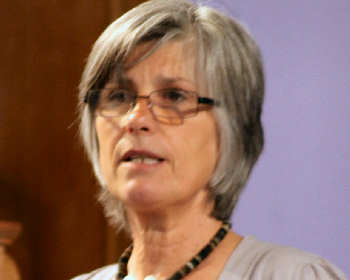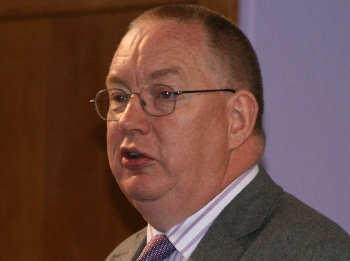
How to find £1.8m of faith funding in Norwich
 BY KEITH MORRIS
BY KEITH MORRIS
2008: Funding the Kingdom, and sharing God’s resources across new and established Christian projects, was the subject of a one-day conference organised by
Transforming Norwich on
Saturday June 7.
Retiring chairman of Transforming Norwich, John Betts, said: “We want to explore how God’s resources might be supplied through a variety of different means, through the giving of his people and corporately across the city.”
Biddy Collyer (right), director of Pregnancy Crisis Norfolk, shared her vision of Norwich as a city of mercy and sanctuary: “As we hold Jesus high over our city we will fulfil our destiny as a city of sanctuary,” she said.
“In medieval times, Norwich was known as the most religious city in Europe. The last Census said we were the most Godless.
“We cannot fulfil our destiny as disciples without unity and we too often work in isolation from each other,” said Biddy. “Once we understand we are God’s one church in Norwich we will bring the vision and God’s kingdom much closer. But many congregations find it hard just to cover their own bills, let alone help fund Christian social action projects.”
Biddy suggested resources can come from Christian businesses, government sources and grant-making trusts. “Regular covenanted giving by the Christian church would help us to fund the Kingdom together,” she said.
“If all 11,000 Christians in Norwich gave just 1% of their income into a central fund that would mean a pot of £1.81m a year, more than enough. When we do come together, the spiritual climate of our county and city will change and the Kingdom will be extended.”
YMCA Norfolk chief executive, John Drake, told the conference: “God will release his resources, but only for his purposes, not ours. There is currently some £50m of Christian building projects going on in our city alone.”
 Paul Whitnall
Paul Whitnall (right), chair of the
Cavendish Foundation, said: “Money comes from people who give it to you because they love you or because you earn it and it is pay for work that you do.”
Before you look for funding you need to ask five basic questions of yourself, explained Paul: Who are you? What do you do? What do you want to do? What difference will it make? What will it cost?
Money can come from several sources: European funds, central government, local government, grant income, sales income, donations, membership and loans or investment, he suggested.
“There is money if our service is mission-led, responds to needs around us, is effective in making a difference and is well thought-out.”
The conference also heard from a panel including Biddy Collyer, John Drake, Norfolk fundraiser Richard Felton and Norwich Diocese Church Urban Fund representative, Rev Peter Howard (all pictured top)